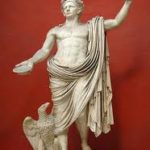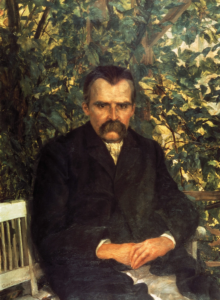CHAPTER 2: JUST THE FACTS…
We are fairly confident that a people called “Israel” existed, thanks to the discovery of the Merneptah Stele—an engraved stone created around 1200 BC. It is the earliest known reference. The stele includes this line: “Israel is laid waste and his seed is not.” This sentence has some interesting implications that I will discuss later on.
The Dead Sea Scrolls, which date to the first century BC, contain fragments from every book of the Hebrew Old Testament (OT), and thus are our earliest proof that the complete document existed by that time. Whether it appeared any earlier is a matter of speculation. If we are to accept the tradition, then, the OT was written over a period of some 1200 years…
An overall picture thus comes into view: There was a Jewish people, called “Israel,” in the region of Palestine from at least the 1200s BC who engaged in a number of conflicts with the surrounding peoples, including the Egyptians. They recorded their own history in the books of the OT, but with substantial amounts of embellishment and speculation, such that many claims are unsubstantiated by modern research. And from the texts themselves, we know that this people viewed themselves as specifically chosen or blessed by their god, Yahweh or Jehovah, and that they saw all others as pagan non-believers, to be treated with contempt.
Enter the Roman Empire
The Roman procurator Pontius Pilate, who governed Palestine from 26 to 36 AD, was known for his aggressive treatment of the Jews. But things grew even worse for them after his removal from power and the ascension of Emperor Caligula in Rome. Hayim Ben-Sasson writes, “The reign of Caligula (37-41 AD) witnessed the first open break between the Jews and the Empire… Relations deteriorated seriously during this time.”
______ 卐 ______
Editor’s Note: Remember that history is written by the victors, and that Caligula was slandered with infinite hatred by the Judeo-Christians, while they destroyed almost all pagan literature in Latin when they seized power. It is essential to remember what Evropa Soberana wrote about Caligula. See for example pages 142-44 of Daybreak: ‘Thus, we do not have a single Roman emperor who participated in the harsh Jewish reprisals who was not defamed with accusations of homosexuality, cruelty or perversion. The Spanish historian José Manuel Roldán Hervás has dismantled many of the false accusations against the historical figure of Caligula’.
______ 卐 ______
Years later, Emperor Claudius issued his third edict, Letter to the Alexandrians, in which he accused those Jews of “fomenting a general plague which infests the whole world.” This is a striking passage; it suggests that Jews all over the Middle East had succeeded in stirring up dangerous agitation toward the empire. It also marks the first occurrence in history of a “biological” epithet used against them. By the year 49, Claudius had to undertake yet another expulsion of Jews from Rome.
 (Left, sculpture of Emperor Claudius.) All this set the stage for the first major Jewish revolt, in the year 66. Also called the First Jewish-Roman War (there were three), this event was a major turning point in history. It eventually drew in some 75,000 Roman troops, who battled against perhaps 50,000 Jewish militants and thousands of other partisans. The war lasted for four years, ending in Roman victory and the destruction of the Jewish Temple in Jerusalem in the year 70. It remains in ruins to this day; only the western wall (“Wailing Wall”) still exists.
(Left, sculpture of Emperor Claudius.) All this set the stage for the first major Jewish revolt, in the year 66. Also called the First Jewish-Roman War (there were three), this event was a major turning point in history. It eventually drew in some 75,000 Roman troops, who battled against perhaps 50,000 Jewish militants and thousands of other partisans. The war lasted for four years, ending in Roman victory and the destruction of the Jewish Temple in Jerusalem in the year 70. It remains in ruins to this day; only the western wall (“Wailing Wall”) still exists.
There would be two more Jewish wars: in 115-117 (the Kitos War), and in 132-135 (the Bar Kokhba Revolt). Thousands died in each, but both ended in Roman victory.
“We are among Jews”
Returning specifically to Christianity, I must note a central fact of the entire religion: The Bible is an entirely Jewish document. Front to back, cover to cover, A to Z, Old Testament and New—the Bible is an entirely Jewish document. The morality, the theology, the social attitudes, the worldview… all thoroughly Jewish. The Old Testament obviously so; it was written by Jews, about Jews, and for Jews. The same holds with the New Testament, although with a slight twist: it was written by Jews, about Jews, but for non-Jews. This twist is crucial to the whole Jesus story.
So let’s look specifically at the New Testament. Regarding this most important document, Nietzsche put it well, I think: “The first thing to be remembered, if we do not wish to lose the scent here, is that we are among Jews.” That is, all the characters are Jews, and all the writers—as far as we can determine—were Jews.
Paul and the Gospels
Born as Saul in Tarsus (modern-day Turkey) around the year 6 AD, Paul was a Pharisee, an elite, orthodox Jew, “a Hebrew born of Hebrews” (Phil 3:5). He also may have been a Zealot, advocating violent resistance to Rome. Speaking in Acts (22:3), Paul says “I am a Jew, born in Tarsus of Cilicia.” He continues: “I was a zealot for God…” (CJB, DLNT) or “I was zealous for God…”—the translations vary. Elsewhere he says, “I was more of a zealot for the traditions handed down by my forefathers than most Jews my age…” (Gal 1:14). There is a subtle difference between him saying “I was a zealot…” and “I was a Zealot…”; the text is not clear, and interpretations differ. But it seems clear that he was an ardent Jewish nationalist opposed to Roman rule, as was the case with most elite Jews of the time…
He changed his name from the Jewish ‘Saul’ to the Gentile ‘Paul’ (Acts 13:9) and began his work…
If Paul was dead by the year 70, then he just missed the destruction of the Temple that dealt a shattering blow to the Jewish community. But something else happened around that time, something equally significant: the appearance of the first Gospel, Mark. Why didn’t Paul cite the Gospels? The conclusion is obvious: They did not yet exist. And indeed, this is what modern scholarship confirms…
The other major problem with the Gospels is authorship. Formally they are anonymous. Mark is “the Gospel according to Mark.” It’s written in third-person grammar, like a textbook, rather than as the personal account of a specific man. The same is true of Matthew. Luke is different; it’s a first-person essay directed to a generic person, “Theophilus,” which simply means “beloved of God.” The fourth Gospel, John, returns to the third-person style of Mark and Matthew.
In any case, it’s almost certain that all the Gospel writers, whoever they were, were Jews. All four contain numerous references to the OT, something that would only be expected of elite and educated Jews. Matthew has the most references—something like 43 direct citations. Mark and Luke have about 20 each, John around 15. But if we include indirect references, parallel wording, and other allusions, the numbers double or triple.
Matthew is clearly and heavily Jewish, the “most Jewish” of the Gospels. No scholars dispute this. Mark has been challenged by some writers, calling him, if not a Gentile, then “a heavily Hellenized” Jew—but still a Jew nonetheless. The confusion seems to arise because he was writing to and for Gentiles; this is an important fact, as I will explain. But it doesn’t change the Jewish authorship.
Luke, though, is claimed by some to be a Gentile work. But this doesn’t hold up to critical analysis. First, Paul himself claims that the word of God was given to the Jews (Rom 3:2) and therefore the Gospel, as the word of God, must have been written by a Jew. Second, the claim that ‘Luke’ is a Gentile name is irrelevant; other Jews, notably Paul, changed their names upon conversion to the cause. Third, Luke is never cited as a Gentile, and his alleged companion, Paul, is never condemned for fraternizing with such a Gentile. Luke furthermore had detailed knowledge of Jewish religious customs, as we see in (1:8-20); Gentiles would not know this. Finally, he claims intimate knowledge of the Virgin Mary, including what is “in her heart” (2:19)—something that a non-Jew would be unlikely to know.
But what about the final Gospel, John? This appears to be the most anti- Jewish—some would say, anti-Semitic—of the four. This could not possibly have been written by a Jew, true? Not quite… As James Dunn says, “John, in his own perspective at least, is still fighting a factional battle within Judaism rather than launching his arrows from without, still a Jew who believed that Jesus was the Messiah, Son of God, rather than an anti-semite”…
Even if the Gospels underwent later modification by Gentiles, as Price and others suggest, this does not change their essentially Jewish nature.
The remainder of the NT also seems very likely to have had Jewish authors. The lengthy Hebrews—which is claimed by some to have been written by Paul—is addressed to Jews and contains at least 36 direct references to the OT. James is addressed to “the twelve tribes in the Dispersion,” and so is 1 Peter. It’s clear that Gentiles would not be lecturing to Jews about God. The other short letters are ambiguous but contain nothing to indicate Gentile authorship.
At some point, of course, Gentiles did join the church and start writing about it. The earliest Church Fathers were probably Gentiles, including Clement of Rome (died ca. 100) and Ignatius of Antioch (d. 110). The same holds for the second generation of Fathers, which would include Quadratus (d. 129), Aristides of Athens (d. 135), Polycarp (d. 155), and Papias (d. 155). Certainly by the time of figures like Marcion, Justin Martyr, Irenaeus, Tertullian, and Origen—in other words, mid-second century to mid-third century—we are dealing strictly with Gentiles…
To summarize this section: Paul now appears as a religious fanatic and ardent Jewish nationalist, willing to resort to violence and even kill non-Jews in order to drive out the Romans. (Later I will also affix to him the label ‘master liar.’) Paul knew nothing of “the four Gospels,” because they did not exist in his lifetime. The Gospel writers themselves were all Jews, as likely were the anonymous authors of the remainder of the NT. The Gospels as documents were likely written between 70 (Mark) and the mid-90s (John). With this factual background in place, we can now examine precisely why the traditional Jesus story is not true. Then we will be one step closer to my central argument: namely, that since the biblical Jesus story is false, it was evidently constructed by Paul and his fellow Jews in order to sway the gullible Gentile masses to their side and away from Rome.










